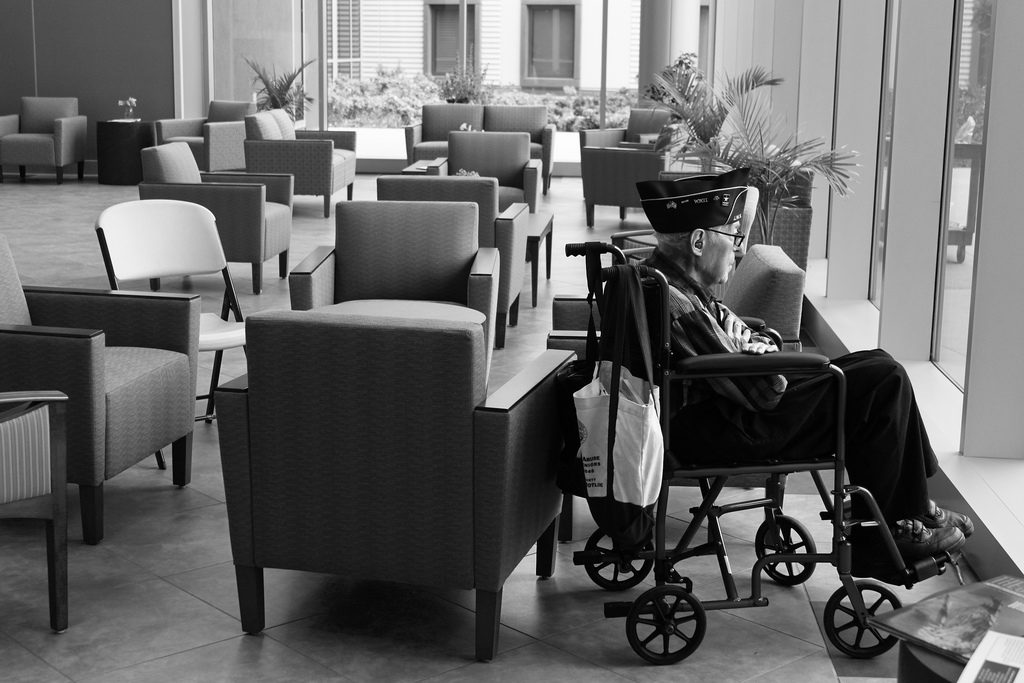A new study published in the Journal of the American Geriatrics Society discusses an investigation into the prescribing practices among veterans with PTSD. The authors utilized data from a large project sample — which was developed in order to identify factors and trends related to the prescribing of second-generation antipsychotics (SGAs) within veterans being treated at the VA and with a diagnosis of schizophrenia, bipolar disorder, or Post-Traumatic Stress Disorder (PTSD). For this analysis, the researchers also looked at data on diagnoses of dementia within the population.
“The odds of an elderly veteran with a diagnosis of dementia and PTSD being prescribed an SGA were at least twice those of an elderly veteran with PTSD alone from 2004 to 2009,” the authors write.

PTSD is a common diagnosis among war veterans and despite the fact that the VA does not recommend SGAs in treating PTSD due to limited evidence in proving benefit, the authors note that veterans with PTSD are the “largest diagnostic group to be prescribed an off-label antipsychotic.”
Older veterans with PTSD are 77% more likely to develop dementia than those without the PTSD diagnosis, and although antipsychotics are often for behavior management with dementia patients they have also been linked to higher mortality risks, higher risk of strokes, falls and other concerns. Research has shown that the risks outweigh the potential benefits of SGAs for individuals with dementia.
Using data from the A Spatio-Temporal Analysis of Newer Antipsychotics (ASTANA) project, researchers identified 93,068 veterans, aged 65 and older, with a diagnosis of PTSD during at least one of the study years. 98% of individuals in the sample were men. Veterans diagnosed with psychosis or bipolar disorder had been excluded from that sample. 11.1% of the veterans identified had received a concurrent diagnosis of dementia. Prescriptions for aripiprazole, olanzapine, quetiapine, risperidone, and ziprasidone were reviewed for this study.
After conducting a logistic regression analysis, the researchers found that within the sample of veterans being cared for by the VA, those diagnosed “with PTSD and dementia are twice as likely or more to be prescribed an SGA as those with PTSD without dementia.”
The authors present this study as the first to report on these prescribing practices for individuals with PTSD and dementia. Given the inconsistent effectiveness of SGAs for both PTSD and dementia, as well as the many adverse effects these can have, the authors highlight the need for more careful prescription practices, as well as the need for further provider education regarding the use of SGAs amongst those with multiple medical and mental health issues.
****
Semla, T. P., Lee, A., Gurrera, R., Bajor, L., Li, M., Miller, D. R., … & Bauer, M. S. (2017). Off‐Label Prescribing of Second‐Generation Antipsychotics to Elderly Veterans with Posttraumatic Stress Disorder and Dementia. Journal of the American Geriatrics Society. (Abstract)















The second generation of antipsychotics collectively has proven itself to be even more detrimental to humans than the first generation, given their adverse effect profile is largely the same as the typical antipsychotics, with the addition of the extreme weight gain/diabetes inducing adverse effects, and Risperdal grows breasts in young boys.
All the antipsychotics do induce a dementia-like effect, that is their primary intended effect, I think. The neuroleptics can, however, also create the negative symptoms of “schizophrenia,” via neuroleptic induced deficit syndrome. And they can also create what appears to the doctors to be the positive symptoms of “schizophrenia,” via anticholinergic toxidrome.
The antipsychotic class of drugs are an iatrogenic illness creating class of drugs, not drugs that cure any of the theorized but scientifically invalid DSM “genetic” illnesses. Absolutely, more insightful and ethical prescription practices are needed at the VA, and worldwide. Basically, the antipsychotics seem to be a drug class prescribed by doctors to harm and silence people in order to cover up the war mongering and profiteering government’s sins, the easily recognized iatrogenesis of incompetent doctors and, according to the medical evidence, to cover up child abuse en mass.
Report comment
It is very important to expose the appalling practice of the prescribing of so-called antipsychotic drugs for people who are suffering from war trauma. But I am surprised that Madinamerica would allow the unchallenged use of terms for psychiatric disorders like “PTSD,” since there is no scientific validation for them, a point that has been documented over and over and over. I hope that Madinamerica and Ms. Pagan-Ortiz will not do this in the future.
Report comment